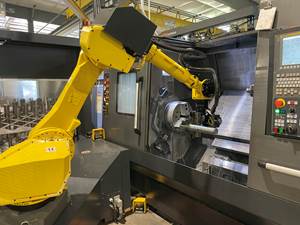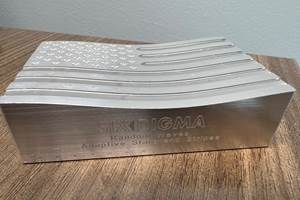Contingent Staffing for the Machining Job Shop
Hiring additional staff is an option to increase capacity, but if the fluctuation in demand is unpredictable and of short duration, you can quickly end up with excess capacity and a fixed expense that is too large for a lower level of business.
Share





Hiring additional staff is an option to increase capacity, but if the fluctuation in demand is unpredictable and of short duration, you can quickly end up with excess capacity and a fixed expense that is too large for a lower level of business. Outsourcing the excess demand to qualified sources is another option for adding capacity. However, this method, while viable, can result in less control of work priorities and probably a slower turn-around time than desired. Another, better, alternative is to temporarily employ recently retired shopfloor workers for these short-term assignments.
Developing a labor pool of retired workers who have the knowledge, skill and ability to make immediate contributions is a great strategy for adding temporary capacity. An easy way to build this pool is to encourage retired employees sign up with a temporary staffing agency. Once they are available as employees of the staffing agency, they are only a phone call away from enabling your capacity to increase for an hour, a day, a month or even longer. Retired workers fit into this model best because they are not looking for a full-time job; rather, many are looking for a job that will enable them to contribute to the success of your business while still meeting their personal retirement goals.
There are many benefits for retired workers interested in being part of this contingent workforce. The work allows them to socialize with other retirees of similar background and interests, while earning a supplemental income that can be used to support their retirement hobbies or meet their living expenses. It also enables them to be mentors and coaches to younger workers. Many retired workers want a flexible schedule that allows them to enjoy leisure activities, and this type of work satisfies that desire. Perhaps the biggest benefit is that continuing to work helps them stay mentally alert and physically active. Many retired workers greatly appreciate the opportunity to work in this capacity.
Your shop can also benefit from this type of arrangement. In addition to temporarily meeting the need for highly skilled and knowledgeable workers when demand changes, these retired workers can, in some cases, fill a void created of skilled workers in the general workforce. Other benefits include:
• Retired workers can cover employee vacations.
• Your regular workforce can increase its competency through knowledge gained by working with seasoned veterans.
• Routine tasks can be assigned or structured to best suit the flex staff, allowing your regular staff to focus on critical activities.
• The retired workers’ flexible schedules should easily fit into the company’s need for schedule flexibility.
• You can maintain control of and prioritize work for quick turn-around or whatever your needs might be.
• The cost to employ these workers is variable; so, when the demand drops off, it is easy to reduce expenses by not employing them. They know when the demand increases again, they will be called back. This model is much different from the “hire and layoff” scenario that is sometimes necessary if business demand drops off and expenses need to be cut.
To be successful with this strategy, you must have a good number of retirees in the pool from which to draw, as it is possible for a large number of workers to be unavailable during certain times of the year. If you are successful in developing this labor pool of retirees, however, you should be able to meet your business needs and the contingent workers’ needs while keeping your customers happy.
About the Author
Larry D. Larson is a retired manager of a precision machining prototype job shop and director of engineering for a major electronics test and measurement equipment company. He is currently an adjunct faculty member for the College of Engineering at George Fox University, teaching materials and processes of manufacturing. He has a bachelor’s degree in mechanical engineering technology and a master’s degree in science and technology management.
Related Content
Same Headcount, Double the Sales: Successful Job Shop Automation
Doubling sales requires more than just robots. Pro Products’ staff works in tandem with robots, performing inspection and other value-added activities.
Read MoreThe Power of Practical Demonstrations and Projects
Practical work has served Bridgerland Technical College both in preparing its current students for manufacturing jobs and in appealing to new generations of potential machinists.
Read MoreShop Tour Video: You've Never Seen a Manufacturing Facility Like This
In the latest installment of our “View From My Shop” series, explore Marathon Precision’s multi-process approach to manufacturing, where blacksmiths and hand-forged dies meet state-of-the-art CNC machining. Discover how restoring classic muscle cars and building custom art projects creates a dynamic shop culture — and draws top talent to this unique and innovative metalworking facility.
Read MoreBuilding Machines and Apprenticeships In-House: 5-Axis Live
Universal machines were the main draw of Grob’s 5-Axis Live — though the company’s apprenticeship and support proved equally impressive.
Read MoreRead Next
Last Chance! 2025 Top Shops Benchmarking Survey Still Open Through April 30
Don’t miss out! 91ÊÓƵÍøÕ¾ÎÛ's Top Shops Benchmarking Survey is still open — but not for long. This is your last chance to a receive free, customized benchmarking report that includes actionable feedback across several shopfloor and business metrics.
Read MoreAMRs Are Moving Into Manufacturing: 4 Considerations for Implementation
AMRs can provide a flexible, easy-to-use automation platform so long as manufacturers choose a suitable task and prepare their facilities.
Read MoreMachine Shop MBA
Making Chips and 91ÊÓƵÍøÕ¾ÎÛ are teaming up for a new podcast series called Machine Shop MBA—designed to help manufacturers measure their success against the industry’s best. Through the lens of the Top Shops benchmarking program, the series explores the KPIs that set high-performing shops apart, from machine utilization and first-pass yield to employee engagement and revenue per employee.
Read More






















